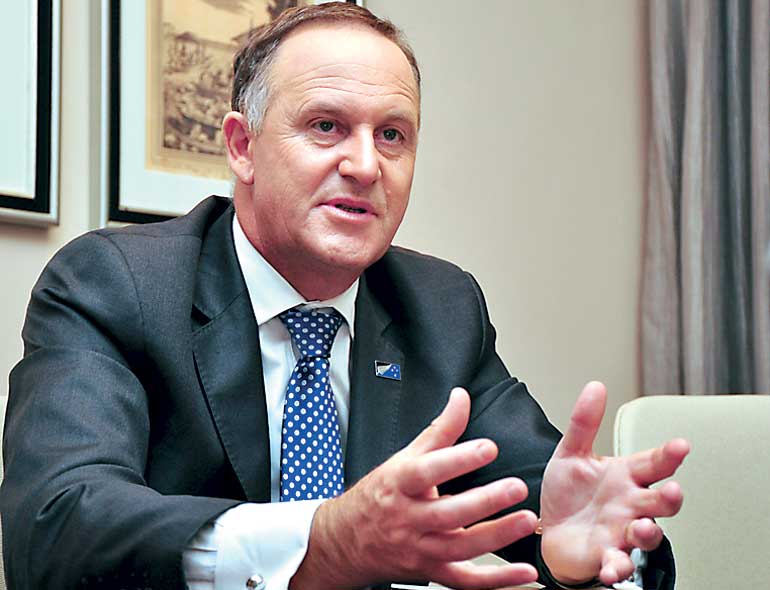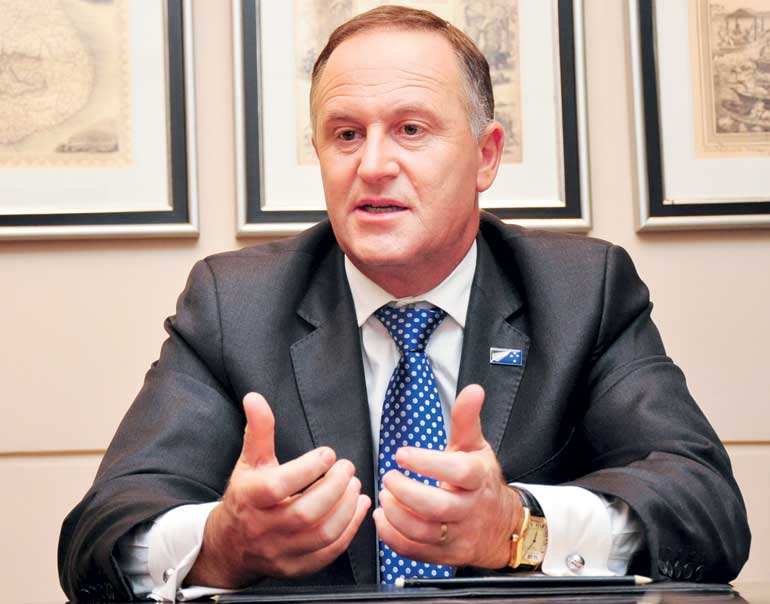Saturday Feb 28, 2026
Saturday Feb 28, 2026
Thursday, 25 February 2016 01:54 - - {{hitsCtrl.values.hits}}

New Zealand Prime Minister John Key
By Uditha Jayasinghe
Q: It’s been two years since you were in Sri Lanka. What in your view are the important changes that have taken place since 2013?
I think the changes have been very noticeable. It is just obvious the country is going from strength to strength, it feels more confident and the infrastructure that has been built is reflective of the positivity of the growth that we see. It’s a different Sri Lanka to the one I saw two and a half years ago.
Q: How do you view the political changes that took place last year?
We are very supportive of what your Government is doing. What I think the Government is working very hard on, from what I can see outside of Sri Lanka’s economic issues, is to really deal with the issues of reconciliation and that is immensely difficult for any Government in any country to undertake. I also think every country has its own issues it has to contend with, so even New Zealand that was very peacefully settled in 1840 with the signing of a treaty we still see the crown did not honour obligations appropriately so 176 years on we are still dealing with some of those issues. So it’s true that every country has to deal with them. I think the Government should be commended on what it is trying to do after the thirty year civil war that claimed an awful lot of lives and caused a huge amount of dislocation in Sri Lanka. So they are putting their best foot forward.
Q: What is your perspective on reconciliation efforts in Sri Lanka? Does New Zealand hope to contribute to this process?
History demonstrates engagement is generally a better option. It’s ultimately more about the future than the past. New Zealand sponsored the UN resolution last year and we are always working with your Government to see what we can do in terms of expertise or financial support that we can offer. We are looking to strengthen our relationship with Sri Lanka. The trading relationship is just under $350 million and it’s been at that level for a long period of time with our big dairy company being a big exporter to Sri Lanka but there are lots more opportunities for us. As part of this we have been visiting the model farm we have here, which we see as a real opportunity to add value to farmers, lift their production and make sure more people can be employed and Sri Lanka can become more self-sufficient in its dairy products as the economy grows and demands for products increase rapidly.

Q: What are the key investment areas your delegation is looking at and what were the economic areas discussed with Sri Lankan leaders?
Agriculture is just really one part both countries can engage in, exporting education for instance is one area where we see quite a lot of opportunity. There are already some Sri Lankan students studying in New Zealand but there could certainly be more. Around tourism we see real potential from New Zealand companies and New Zealanders love travelling; Sri Lanka I see has a very hot place in the years to come. For a while it has been Croatia but I wouldn’t be surprised if it changes to Sri Lanka. The other thing is the manufacturing space, ICT or technology as we have quite a few people in that category. Interestingly, New Zealand is quite a niche producer because we are very small so what we would most likely do is produce something that is part of the manufacturing process done in Sri Lanka. So it’s not always going to be a finished product and maybe just a component so again it becomes a win-win.
Q: Given the global competition for investment why would you pick Sri Lanka?
The first thing is the economic reforms the Government is undertaking, which to us seem the right ones, so we look at India and we see a lot of really good initiatives from Prime Minister Modi but the question is can he actually pass them through parliament? The system is very different from China though they have also undertaken significant reform, and Sri Lanka is nimble enough, I think, to be able to adapt and change and grow. If we look around the region we certainly think Sri Lanka will be one of the countries that will really do well. We have been quite forward leaning on Myanmar as well, which many years ago, like Sri Lanka, we had a difficult relationship with because we did not support what was happening there, but in recent years we have normalised our relationship and see Myanmar growing.
Q: The new government is working hard to increase international investment but the global environment is challenging. What do you think Sri Lanka needs to focus on to make itself more attractive to global investors?
One of the issues Sri Lanka is dealing with is corruption and that is always a really important issue because corruption makes it very difficult for foreign investors to do business in that country. They don’t understand the system well and if they are listed public company then that causes issues for them so it is very debilitating. The second thing is infrastructure. If you want to grow then you need strong infrastructure so everything from hotels, stable electricity supplies, broadband, education and Free Trade Agreements (FTA) are all crucial. We look at tariff structures that our companies pay at the moment, those tariffs are too high and what that does is stop important component parts being exported to Sri Lanka. One of the points made to me by the Prime Minister was that they need to reduce tariffs on imports. So we can actually support each other. The same process has happened in New Zealand where we have eliminated our tariffs and made it easier for imports and we have grown as a result of that.
Q: Fonterra is the largest New Zealand Company operating in Sri Lanka but over the past few years the Sri Lankan government has worked to increase protectionism through aggressive import substitution policies. How do you think both countries can work to expand the industry without cutting each other out?
I think where the rubber meets the road is on dialogue and engagement. There are always other avenues to resolve these issues but I think our preferred option is this. I think the Government is looking to make changes, I expect they want to address those issues over time; all we can do is give them the benefit of our experiences. In 1984 New Zealand was far more closed than Sri Lanka and it was almost impossible to get anything in and we had very very big barriers and then almost overnight we completely removed those barriers, so that was very rapid. But actually New Zealand produced very poor products prior to removal of its protectionist methods and world class products afterwards because ultimately competition is a very healthy thing and makes companies succeed. Even though some of your business people argue they need protection, actually if it is removed, there is no question they will learn to adapt and grow and be far more successful. We New Zealanders say you have to “be cruel to be kind,” it’s the same kind of logic, sometimes you just have to remove those barriers to realise your companies will prosper as a result.
Q: You are in Sri Lanka with a business delegation. What are their views?
I think they see real opportunity here, so they would say, at the moment Sri Lanka is a small market for them, but there is huge potential. One of the biggest issues for New Zealand is that China is our biggest market so we are always fearful of a concentration of risk. We sell too many products to China and if there is downturn, all of a sudden we are left exposed. This does not mean we should not supply to the Chinese market, we absolutely should and we have great friends in China. But what New Zealand needs to have is a patchwork of markets. We have raised issues with Sri Lanka and we will wait to see where they go. We have invited the president and prime minister to New Zealand and we are hoping they will both be able to come at some point but I think they are conscious of the reforms they need to undertake.
Q: There have been reports of Sri Lankan asylum seekers attempting to reach New Zealand but being turned back by the Australian navy, in some instances at cost to their lives. There are also accusations by rights groups that the New Zealand government is turning a blind eye to Australia’s questionable asylum policies. What is your response to these charges?
The first thing is that by definition we are so far away it is more challenging for a boat to come to New Zealand, not impossible, the advice I get is that at some point it is possible a boat may come but it’s a lot more challenging. So Australia has always deployed more resources here because it’s had a lot of boats come to Australia, so we have not had to deal with it in quite the same way. I think secondly, both Australia and New Zealand support migration and refugees but if we don’t have people coming through the lawful mechanism, then the system breaks down. The third point would simply be that some of the boats have tried to come to Australia and not made it. People smugglers prey on vulnerable people and have cost the lives of thousands of innocent people, so at one level stopping them coming saves lives. But what we do is we are part of a regional solution and we do everything we can to deter people from coming through unlawful channels.
Pix by Lasantha Kumara